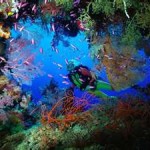 As the temperatures drop at this time of year in Wisconsin, my thoughts turn to diving in the Caribbean.
As the temperatures drop at this time of year in Wisconsin, my thoughts turn to diving in the Caribbean.
Scuba diving is my family’s hobby, and we have dived (and snorkeled) throughout the Caribbean. I have seen almost anything imaginable on dives except for sharks. I know (and actually hope) they are there, swimming at the edge of the reef, but I haven’t been fortunate to see one yet.
My favorite animal to spot is a ray. The eagle rays look like birds soaring through the water. Once I came close to a barracuda. In my excitement I forgot to back away and had to be pulled back. Another time our boat came upon a pod of dolphins that jumped and raced with the boat.
The most intense dive I’ve done was a night dive under the town pier in Kralendijk, Bonaire (the Netherlands Antilles). Entering from the shore, all I could see at first was the fins of the person swimming in front of me. Slowly we descended to about thirty feet. In a night dive, everything is dark except for the blinking lights of the flashlights carried by other divers. My goal was to keep the dive leader in sight at all times. We stayed inside the cement columns holding up the pier.
The advantage of a night dive (other than the excitement of swimming in the ocean in the dark), is that you can see the brilliant colors of the animals and coral when you shine your flashlight on them. The colors are more vivid than in the day. Every inch of the columns is covered in an explosion of color: beautiful, healthy coral and anemones. Fish come in to feed at night, and a person can observe their different night behaviors. Our highlights were finding several seahorses and a large eel swaying at the bottom of one column.
In Cozumel, the currents take a person, so you feel like you’re flying. In Jamaica, we dived through some channels that reminded me of wandering through the sandstone cliffs in the Wisconsin Dells.
Underwater, the world is bright and light filled. The closest it comes to is walking or running through an open field.
People like to say that diving is a lazy sport. On some level that’s true—it’s important to conserve your air and swim efficiently. Diving has a meditative quality to it. You have to be aware of your breath and how your movement affects your breath. You have to watch your gauges and monitor your depth and buoyancy. The only thing you hear is your regulator as you breathe in and out.
One of the things I like most about diving is that I really feel integrated with the water and the marine ecosystem when I’m diving. I realize that I am no more important than any of the fish or other creatures in the water. Fish in the wild are intelligent—a person can observe their intelligence through their interactions with other fish. They play, hide, fight, and make friends. They check a person out. Once a juvenile sergeant major fish swam with us for over an hour in a cove in Bermuda.
I haven’t yet dived the Great Lakes, but I’ve heard the wrecks are in excellent condition.
I’d be interested to hear from other divers of the conditions you’re observing at the sites you dive. What are your dive stories? The National Aquarium in Washington, D.C. features exhibits of national marine sanctuaries and parks and makes a great starting point for planning aquatic trips.
If you’re interested in reading more about laws related to the protection of the ocean, read here. Diving without gloves and using a no touch/don’t take policy in the ocean is part of responsible diving and snorkeling. When you eat fish, avoid fish laden with toxins and look for properly harvested fish. Here is a great site on buying and eating fish.

Though I prefer snorkeling, I admit being tempted by your descriptive stories, as well as by a new underwater museum a friend heard about on NPR. Have you seen this? http://www.aquaworld.com.mx/underwatermuseum.html
Interesting to read about the integration of your interest in diving and in laws protecting the ocean.
You might enjoy this, it’s about a young girl’s efforts in Australia to pass laws supporting shark conservation.
http://www.youtube.com/watch?v=PC_Uw9z2ync